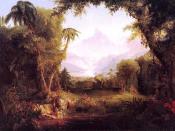Introduction: "Homo Suburbiensis" is as much a poem about the human condition, as it is a record of one man's escape from the demands of his existence. "Homo Suburbiensis" uses one man's escape from his demands to represent our universal need to contemplate and resolve our own uncertainties in life in our own special place. Dawe uses a series of imagery to depict the workings of our minds and a chain of unpleasent sensory experiences to illustrate unwanted intrusions in our lives. Through the vague depictions of these intrusions Dawe urges us not to give great attention to them, but to offer to the world, our most truthful emotions and thoughts.
"The man" in the poem is not just a one individual. Dawe suggests this in his title "Homo Suburbiensis". He has classified that man as an example of a whole (invented) species, as "Homo Suburbiensis". The invention of the Latin sounding word "Suburbiensis" is a reference to those of us who live in the suburbs and the suburbians being a status allusion to the ordinary, working class people.
So the title is "Homo Suburbiensis", leads us to believe that "the man" is not an individual but a metaphor for the ordinary people of Australia.
"...Patch of vegetables" in the first stanza can be seen as the private territory of "the man" as it is "...his patch of vegetables". The "...patch of vegetables" which is in the garden, could be seen as parallel to the Garden of Eden. Eden is seen as a paradise for the man and this garden is also being a paradise to this man. This "...patch of vegetables" as a sanctuary is again implied in the third line of the same stanza by the ambiguity of the word "things". Dawe could have used the word...



Very good!
I have never read this poem but i think that I will now-I thought that this would be about history or something and lo and behold it relates to many men i know. Thank you for the great analysis man.
3 out of 3 people found this comment useful.